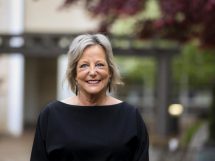Grant moves ‘Charting Our Course’ campaign total past $600 million
LOUISVILLE, Ky. (May 24, 2012) — The University of Louisville has received $6.3 million from the Leona M. and Harry B. Helmsley Charitable Trust to support research in the Department of Neurological Surgery and the Kentucky Spinal Cord Injury Research Center at UofL developing the next generation of technology to help paralyzed people regain movement in their limbs and enhance their quality of life.
In May 2011, Susan Harkema, Ph.D., professor of neurological surgery, and Jonathan Hodes, M.D., chair of neurological surgery, and their colleagues published a study in The Lancet demonstrating that the use of continual direct electrical stimulation of a patient’s lower spinal cord using “off the shelf” technology designed for pain relief can allow a person to go from being wheelchair-bound to being able to stand, remain standing and bear weight. Researchers at the University of California, Los Angeles (UCLA) and California Institute of Technology (Cal Tech) collaborated on the study.
Since that time, the team has replicated its findings in at least two more patients, and the Helmsley Charitable Trust grant will help the team develop the technology needed to advance the research. Researchers from UofL, UCLA, Cal Tech and Case Western Reserve are involved in the development of the new technology.
“One of the biggest issues we face is the limitations imposed by the technology,” Harkema said. “We need to develop the next generation of electrical stimulator containing the best possible circuitry and a new control system so that patients can have the ability to take advantage of this therapy at home and in their communities. Currently, it is limited to use in the laboratory here in Louisville.”
“We’re excited that this work has already proven what many thought was impossible: patients with absolutely no motor function can stand and step with assistance,” said John Codey, trustee of the Helmsley Trust. “We hope the innovative work conducted by the faculty and staff of the University of Louisville and its partners continues to advance the technology and research base needed to treat more patients, resulting in improved outcomes.”
In the paper from May, Harkema and her colleagues demonstrated that continual direct epidural electrical stimulation of the subject’s lower spinal cord mimics signals the brain normally transmits to initiate movement. Once that signal is given, the research shows, the spinal cord’s own neural network combined with the sensory input derived from the legs to the spinal cord is able to direct the muscle and joint movements required to stand and step with assistance on a treadmill.
The other crucial component of the potential therapy is an extensive regime of intensive physical therapy training called Locomotor Training while the spinal cord is being stimulated and the subject suspended over the treadmill. Assisted by rehabilitation specialists, an individual’s spinal cord neural network is retrained to produce the muscle movements necessary to stand and to take assisted steps.
More than 5 million Americans live with some form of paralysis, defined as a central nervous system disorder resulting in difficulty or inability to move the upper or lower extremities. More than 1.275 million are spinal cord injured, and of those many are completely paralyzed in the lower extremities.
Relief from secondary complications of complete spinal cord injury — including impairment or loss of bladder control, sphincter control and sexual response — could prove to be even more significant.
Grant moves UofL campaign past $600 million
This grant has added significance for the University of Louisville, as it pushes past $600 million the amount raised during the Charting Our Course comprehensive campaign, which has a goal of $1 billion by 2014.
“The support we have received from throughout the country has been extraordinary,” said Keith Inman, vice president for university advancement at UofL. “People understand that UofL is working to transform people’s lives, whether it be through innovative educational programs and opportunities, dynamic research that improves the health and well-being of citizens, or a professionally nurturing work environment.”
The Leona M. and Harry B. Helmsley Charitable Trust aspires to improve lives by supporting effective nonprofits in health and medical research, social services, education, and conservation. The Trust, established in 1999, is administered by four trustees selected by Leona Helmsley. As a continuation of Mr. and Mrs. Helmsley’s generous giving throughout their lifetimes, the Trust supports a diverse range of organization and has committed more than $540 million in grants to charitable organizations since 2008.



















Add Comment